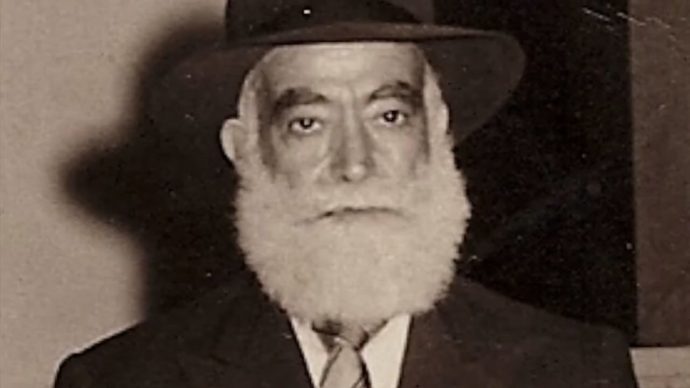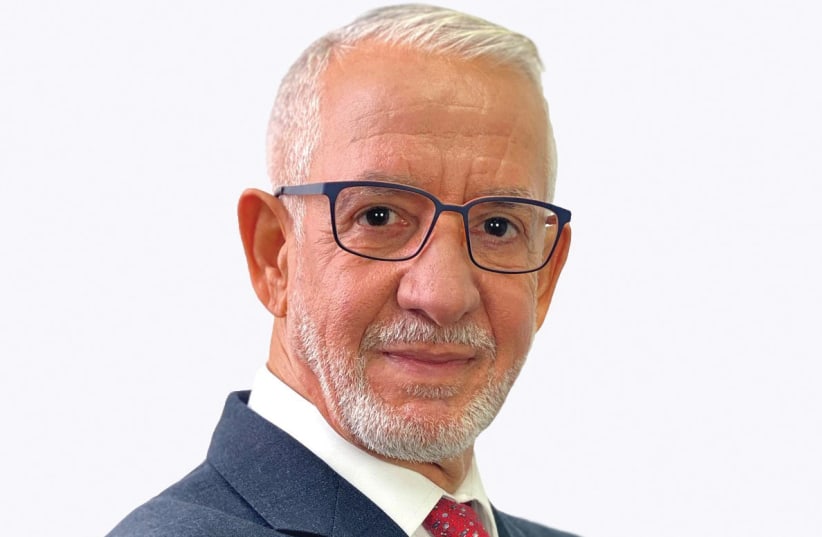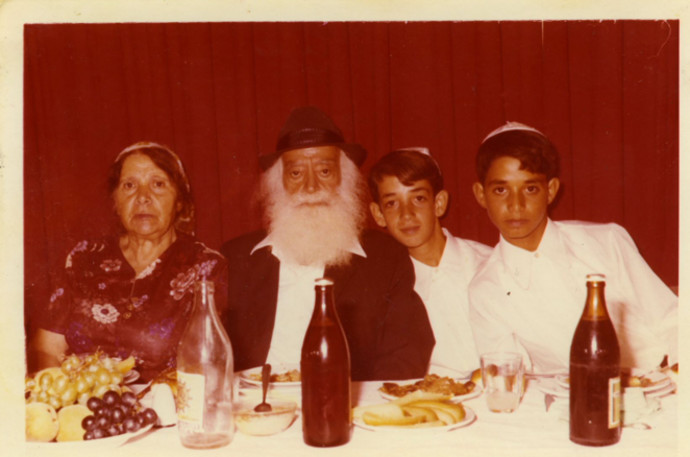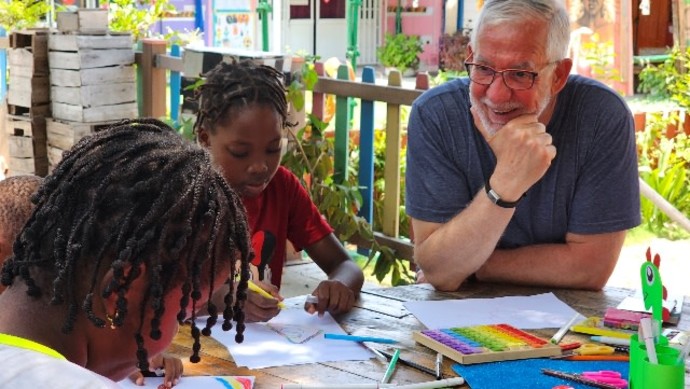“It is a great honor to be the first person to light a commemorative torch in memory of the Jews of Tunisia and North Africa at the March of the Living in Auschwitz - Birkenau,” says Haim Taib, founder and president of the Mitrelli Group and the Menomadin Foundation. “If my father was still alive to see this, he would shed tears of joy.”
While most are familiar with the Holocaust in Europe during World War II, few are aware of the difficult conditions faced by the Jews of Tunisia during a difficult six-month period in late 1942 and early 1943. After American forces landed in French Morocco and Algeria in November 1942 as part of Operation Torch, the Nazis decided to take over Tunisia to prevent the Allies from defeating the German and Italian forces. On November 22, 1942, the Germans began to take control of the country. Over the next six months, the Allies and Germans fought a series of bloody, bitter battles until the Germans were finally defeated in May 1943.
During the six months of occupation, the SS imprisoned 5,000 Jewish men in forced labor and detention camps on the front lines and in cities throughout the country. Jewish institutions were closed, the German troops threatened Jewish women, and the Jewish community was subjected to heavy fines. All told, close to 1,000 Tunisian Jews are estimated to have died during the period.

Born in Jerusalem in 1960 to Tunisian immigrants, Haim Taib grew up in Olesh, a small agricultural settlement in central Israel, with his seven siblings. Taib recalls that his parents frequently talked about the fact that their parents were Holocaust survivors. The children were not aware that the Nazis had controlled Tunisia. “One day,” he continues, “our father told us about his childhood experiences – how his mother was afraid when the Germans came into Tunis, and that the Nazis had taken my grandfather and his brother to the labor camps. Suddenly, in one day, their entire world changed. They could no longer go out in public places, and their mother hid their daughters so that the Germans couldn’t find them.”
Haim Taib would grow up to become a successful businessman and an expert in strengthening and developing countries through an array of impressive projects across Africa. He documented the family’s harrowing experiences in Nazi-controlled Tunisia, as told to him by his father, Eliyahu (“Lulu”), in his autobiography, “Following the dream” (Holech im Hahalom). Lulu, one of ten children born to Haim and Kuka, grew up in Tunis, the capital city of Tunisia.
In the book, Taib describes the desperate conditions in Tunis during the war. “The windows of the houses were covered with dark sheets, and darkness descended on the city to defend against the Allied bombings that were searching for the anti-aircraft positions that the Germans had deliberately scattered within civilian neighborhoods. Every day, the sound of sirens and explosions pierced the air.” Lulu’s father, Haim, and his mother’s brother Zion were captured by the Germans and taken to a forced labor camp. Four months later, Haim and Zion escaped from the labor camp and returned home, clothes in tatters, and their bodies broken and bruised. Haim’s wife urged them to hide in the house until the war ended. The bombings continued, houses collapsed, and many Jews were killed.
On May 7, 1943, Tunisia was liberated from Germany. The Jewish residents of Tunis filled the synagogue to offer prayers of thanksgiving, and a parade was held through the streets of the city. Later, the people visited the forced labor camps where the Nazis had enslaved the Jews, including Lulu’s father and uncle.
Though World War II raged throughout Europe, life in Tunisia returned to normal after May 1943. People went back to work, and children returned to school. When the war ended in 1945, and the Taib family realized the horrors of the Holocaust, Lulu’s father, Haim, declared that the future of the Jewish people was in Israel. Lulu joined the Betar youth movement and began to study Hebrew. After the establishment of the State of Israel in May 1948, conditions worsened for the Jews of Tunis. In 1949, the Taib family, together with many other Tunisian Jews, boarded the Sangier and sailed to Israel.
In 1979, the grandson, Haim Taib entered the IDF and joined the armored tank corps. He served in the First Lebanon War in 1982 and remained in the army for an additional year after the war. After receiving his military discharge, Taib entered the workforce.
In 1991, he traveled to Angola on behalf of an Israeli-owned Portuguese company to develop its business interests there. From the moment he landed in Africa, Taib was enchanted with the continent and its possibilities.
Haim Taib and his company, Mitrelli Group, over the years have developed innovative, pioneering solutions on the continent in the fields of food security, water, healthcare, housing, education, telecommunications and energy. Over the past thirty years, Taib and his team have been a vital force for positive change in Africa, utilizing Israeli technology to contribute to the development and growth of Angola in particular after its devastating civil war.
In 2002, after the war in Angola ended, Taib recommended that Angola emulate Israel in advancing agriculture as a path to success. “I suggested that we imitate what our parents did in Israel – to strengthen the country via agriculture,” says Taib, “I said, ‘Let’s make communal settlements in Angola.” In Israel, such villages are known as kibbutzim and moshavim.
Taib also suggested that the Angolan government utilize discharged soldiers from both sides of the recently ended conflict to build cooperative villages, and then went on to help establish the program with the assistance of other Israelis. “We called it Aldeia Nova, which means ‘the new village’ in Portuguese.”
The Angolan Government allocated a vast area of 20 hectares in a stunning valley in northwest Angola – close to 50,000 acres – for Aldeia Nova, which built 18 villages, each housing between 150 and 180 families. Residents raised chickens and cows and grew vegetables. The project remains active and is considered to this day one of Angola’s most successful ventures, providing for over 1,200 families and many other thousands who benefit from its products. Aldeia Nova was not only successful in providing food and employment but in implanting peaceful relations among soldiers who had fought against each other and were now cultivating the land together. Taib notes that the concept of getting diverse people to live and work together was adopted from the moshav where he grew up, where Jews of different origins worked the fields together and learned to coexist.
“I came to Africa for the first time in 1991,” recalls Taib. “I didn’t know what to expect. “Years later, I understood that my involvement there involved three different dimensions – my parents coming from Africa, my returning to Africa, and using my company to implant the values that I received from my home – a love of Israel, a love for others, giving to others, and respecting people.”
He added, “These values drove us to work with local partners and create sustainable positive impact in the same way we developed the State of Israel from 1948 until today. By taking the values that our parents used to build our country – youth villages, development of water, education and agriculture, and bringing them to Africa and applying them through technology and innovation, we are living the age-old Jewish teaching of Tikkun Olam.”
Taib noted that the fact that the family of his wife, Iris, experienced the full horrors of the Holocaust in Romania and Hungary adds to the significance of his lighting the torch at the March of the Living this year. “When I join with my wife Iris, a granddaughter of survivors, to light the torch at Birkenau, it will provide an extra level of strength and significance. I am lighting on behalf of the Jews of North Africa, and she is participating on behalf of her family, in particular her grandmother Miriam Heiman and great aunt, Eva, themselves Auschwitz survivors”.
Haim Taib does not consider his childhood home as one of Holocaust survivors, but he acknowledges that his father and grandfather experienced the Nazi occupation and it is a valid Holocaust story which needs to be remembered. “To be able to participate in this year’s March of the Living representing the Jews of Tunisia is a great accomplishment, as the son of those who were saved. These events happened, and people must know about it and retell the story to others.”


